Best organic treatments for Indoor Plants

Caring for indoor plants goes beyond just making our homes look beautiful; it’s also about creating a healthier indoor garden. The key to making sure our indoor greenery thrives lies in choosing organic treatments. These natural solutions not only benefit the well-being of our plants but also protect our homes from harmful chemicals.
In today’s gardening world, where plants care is important, it’s important to extend eco-friendly practices to our living spaces. Opting for organic treatments for indoor plants aligns with this goal by avoiding synthetic chemicals that can be harmful to both plants and the environment. By embracing non-toxic gardening methods, we contribute to a safe and healthy home.
DIY Organic Plant Care 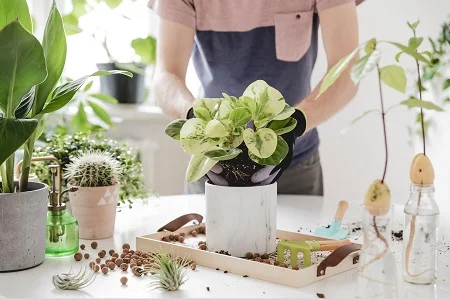
Engaging in do-it-yourself organic plant care can be a fulfilling experience. This approach allows you to take control of your indoor garden’s well-being using simple and effective methods. Ecoindoorgardening guide will step you through the steps to provide your indoor plants with the care they need, enabling a more clear and sustainable living space.
Homemade Liquid Composts 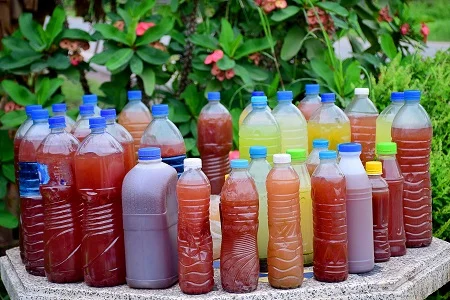
- Benefits of Homemade Plant Composts:Making your liquid compost at home brings several advantages compared to store-bought alternatives. These homemade composts not only supply vital nutrients to your indoor plants but also support a more sustainable and cost-effective gardening approach. By recycling kitchen waste and using natural ingredients, you can create composts specifically tailored to meet the unique needs of your plants.
- Recipes for Organic Liquid Composts
- Nutrient-rich Compost Tea: Compost tea acts as a nutrient powerhouse that boosts soil health and enhances plant growth. To create this organic elixir, simply mix well-aged compost with water and let it steep. The result is a nutrient-rich liquid that can be directly applied to the soil, providing your indoor plants with a natural and balanced boost.
- Seaweed and Fish Emulsion Blend: Mixing liquid seaweed extract with fish emulsion creates a potent compost rich in trace elements and essential minerals. This blend not only breeds your indoor plants but also stimulates microbial activity in the soil, fostering a healthy root environment.
- Epsom Salt and Banana Peel Infusion: Epsom salt, an excellent source of magnesium, is important for plant growth. Combine it with a banana peel infusion for a nutrient-packed liquid compost. The banana peels add potassium and phosphorus, creating a balanced solution that supports flowering and fruiting in your indoor plants.
Incorporating these organic liquid composts into your indoor plant care routine ensures the well-being of your plants while contributing to a greener and more tolerable lifestyle.
Natural Care for Houseplants 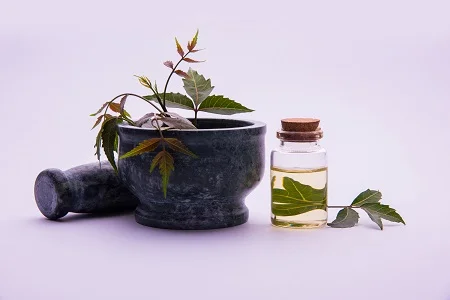
- Eco-Friendly Indoor Plant Care Practices:Maintaining a balance between your living space and the environment is essential. Adopting eco-friendly indoor plant care practices ensures that your houseplants succeed while minimizing your ecological footprint. From sustainable watering techniques to mindful waste management, incorporating these habits changes your indoor gardening into a greener, more responsible endeavor.
- Using Organic Plant Nutrients:Crafting your organic plant nutrients at home adds a personal touch to your indoor gardening routine. Explore easy and effective recipes for organic plant nutrients that not only nourish your houseplants but also align with your commitment to environmentally friendly techniques.
- Safe Indoor Plant Care Tips
Creating a safe environment for your indoor plants goes beyond avoiding toxic chemicals. Ecoindoorgardening provides practical tips for ensuring the well-being of both your plants and your household. From selecting pet-friendly plants to ensuring proper ventilation, these safety measures enhance the indoor plant care experience.
Safe indoor plant care involves more than just avoiding toxic chemicals; it encompasses an approach to creating an optimal environment for both your plants and your household. Here are some practical tips to ensure the well-being of your indoor plants:
- Tip 1: Choose pet-friendly plants:Selecting indoor plants that are safe for pets is essential. Some common houseplants can be toxic to animals if eaten. Analyse and choose plants that are non-toxic to your plants to prevent any unexpected harm.
- Tip 2: Proper Ventilation:Ensure proper air circulation in your indoor space. Good ventilation not only benefits your plants by preventing the buildup of extra humidity but also contributes to a healthier indoor environment for you and your family. Consider opening windows or using fans to promote air exchange.
- Tip 3: Avoid overwatering:Overwatering is a common issue that can lead to root rot and other plant problems. Establish a consistent watering schedule and pay attention to the specific needs of each plant. Use well-draining soil and pots with drainage holes to prevent waterlogging.
- Tip 4: Conscious Use of Compost:While composts are essential for plant growth, overusing them can harm your plants and may lead to chemical imbalances. Follow recommended guidelines for composting, and choose organic or pet-safe composts whenever possible.
- Tip 5: Check for pests:Regularly inspect your plants for signs of pests. Insects can quickly spread and damage your indoor garden. If you notice any pests, consider natural pest control methods, such as introducing beneficial insects or using neem oil.
- Tip 6: Organic Pest Control:Opt for organic pest control methods to protect both your plants and your indoor environment. Organic treatments like neem oil, insecticidal soap, or introducing predator insects can effectively manage pest issues without resorting to harmful chemicals.
- Tip 7: Proper lighting:Ensure your indoor plants receive adequate light, as each plant species has different light requirements. Position them near windows or use artificial grow lights if needed. Avoid exposing plants to direct sunlight for extended periods, as this can cause sunburn.
- Tip 8: Regular Cleaning:Dust can accumulate on plant leaves, restricting their ability to photosynthesize. Wipe the leaves gently with a damp cloth to remove dust. This not only improves the plant’s health but also enhances the aesthetic appeal of your indoor garden.
By following these safety measures, you can create a nurturing and secure environment for your indoor plants, promoting their well-being and contributing to a healthier living space for your household.
Organic treatments for Common Plant Issues
1. Iron Deficiency in Plants: Organic Treatment 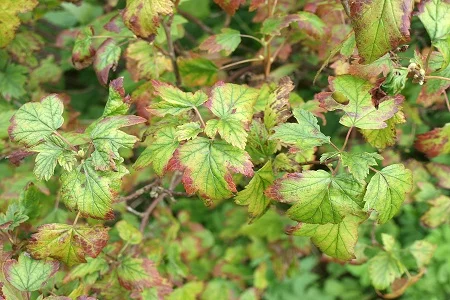
Iron deficiency in plants can lead to yellowing leaves and poor growth. To address this issue organically, consider the following treatments:
- Compost Enrichment:Add well-aged compost to the soil. Compost is a rich source of organic matter and helps improve soil structure, making iron more accessible to plants.
- Mulching with Organic Materials:Mulch the base of the plants with organic materials such as straw or wood chips. This not only conserves soil moisture but also promotes microbial activity, aiding in the release of iron for plant uptake.
- Epsom Salt Solution:Dissolve Epsom salt (magnesium sulphate) in water and use it as a soil drench. Epsom salt provides magnesium, which can help improve the plant’s ability to take up iron.
- Nettle Tea:Create a nettle tea by steeping nettles in water. This nutrient-rich tea can be diluted and applied to the soil, providing a natural boost to iron and other essential nutrients.
Remember to monitor the pH of the soil, as iron availability is influenced by soil acidity. Maintaining a slightly acidic to neutral pH range enhances iron absorption by plants.
2. Organic Treatment for Early Blight in Tomato Plants 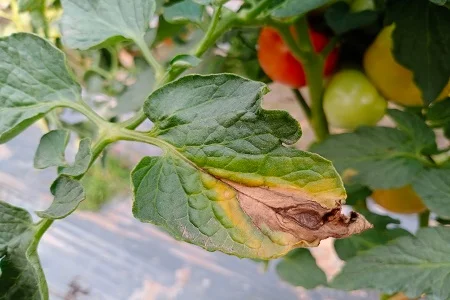
Early blight, a common fungal disease affecting tomato plants, can be managed organically with these methods:
- Baking Soda Spray:Mix baking soda with water and a few drops of dish soap. Spray this solution on the affected plants, as it has antifungal properties that can help control early blight.
- Neem Oil:Neem oil is a natural fungicide and can be applied to tomato plants to prevent and manage early blight. It also acts as an insect repellent.
- Copper-Based Fungicides:Copper-based fungicides, such as Bordeaux mixture, can be used in organic gardening to control fungal diseases. Follow application guidelines to prevent copper buildup in the soil.
- Crop Rotation:Practice crop rotation to reduce the risk of disease recurrence. Avoid planting tomatoes in the same location for consecutive seasons.
3. Organic Treatment for Plant Lice (Aphids) 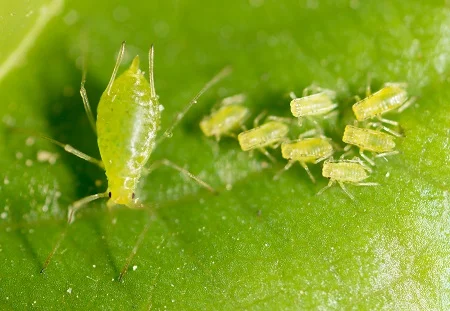
Plant lice, or aphids, can harm plants by feeding on their sap. Here are organic treatments to control aphid infestations:
- Homemade Soap Spray:Mix a mild soap (like Castile soap) with water and spray it on affected plants. The soap disrupts the aphids’ cell membranes and causes them to dehydrate.
- Neem Oil Spray:Neem oil not only has insecticidal properties but also disrupts the life cycle of aphids. Dilute neem oil in water and spray it on the plants.
- Beneficial Insects:Introduce natural predators like ladybugs or lacewings, which feed on aphids. Creating a habitat that attracts these beneficial insects can help control aphid populations.
- Garlic Spray:Create a garlic-infused spray by mixing garlic cloves with water. Strain the mixture and spray it on plants. Aphids find the garlic odor repellent.
Regularly inspecting plants and promptly managing any aphid presence helps prevent overall infestations. Combine these organic treatments for effective and environmentally friendly aphid control.
Chemical-Free Indoor Gardening
Chemical-based plant treatments may promise quick results, but they come with inherent risks. From soil contamination to potential harm to pets and humans, the downsides of using chemical solutions in indoor gardening cannot be overlooked. Understanding these risks is the first step towards transitioning to a safer and more tolerable approach.
- Organic alternatives
Adopting organic alternatives is the key to chemical-free indoor gardening. We delves into three powerful organic solutions that address common issues faced by houseplants.
- Neem Oil for Pest Control: Neem oil, derived from the neem tree, is a natural insecticide and fungicide. Its properties not only combat pests but also act as a preventive measure. Make sure your indoor plants remain pest-free.
- Essential Oil Sprays for Fungal Issues: Harness the antifungal properties of essential oils such as tea tree oil, neem oil, or cinnamon oil to fight fungal issues in your indoor garden. These natural alternatives provide effective protection without the harmful side effects of chemical fungicides.
- Garlic and Pepper Repellent Solutions: Create a powerful repellent by combining garlic and pepper, preventing pests from attacking your indoor plants. This organic solution not only protects your plants but also adds a layer of defense against harmful insects.
By analyzing and implementing these chemical-free indoor gardening practices and organic options, you not only safeguard your houseplants but also contribute to a healthier and better living place.
Final Thoughts
Elevate your indoor gardening experience by exploring organic treatments that not only enhance the well-being of your plants but also contribute to a sustainable and eco-friendly lifestyle. From DIY composts to chemical-free solutions, our guide empowers you to create a successful indoor garden while minimizing your ecological impression. Embrace the beauty of green living today!
As you embark on your journey of caring for indoor plants, remember that a balance of attention, observation, and organic treatments will promote a successful indoor garden.











